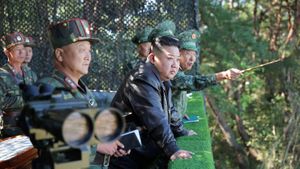China's recent forum on media and think tanks held on November 12, 2024, kicked off with Brazilian President Lula da Silva welcoming his Chinese counterpart, Xi Jinping, to São Paulo. This gathering, titled the “First Forum of Media and Think Tanks of the Global South,” saw participation from over 350 representatives from 170 various media outlets, think tanks, and enterprises spanning across more than 70 nations.
While this might seem like just another diplomatic event coinciding with the impending Group of 20 summit, it’s part of a larger strategy employed by China to bolster its influence worldwide. For example, before the recent BRICS meetings, China organized the Global South Think Tank Forum, which showed Beijing’s intentions of solidifying connections with key players.
This engagement strategy isn't new—China has been actively using people-to-people exchanges to amplify its international presence since Mao Zedong’s era. These exchanges serve as tools to shape global public opinion and promote China's image through cultural interactions and shared narratives.
China's engagement covers diverse regions, including Asia and Africa, where it has facilitated forums with civil society actors intending to create alignment with its political directives. Latently, similar ambitions manifested through events like the China-CELAC Forum for Latin America, which established various adjuncts dedicated to enhancing China’s ties with Latin American states.
Hosting such dialogues appears benign and comparable to programs initiated by Western nations, such as the Alliance Française or the Goethe-Institut; both aim to promote cultural exchange and provide platforms for mutual engagement. Nevertheless, China’s approach raises eyebrows due to its fundamentally different framework of civil society engagement.
While Western entities often encourage dialogues devoid of governmental influence, China’s exchanges inevitably operate under the watchful eye of the Communist Party. This reality draws attention to the inherent constraints faced by Chinese participants, including journalists who must adhere to strict censorship laws when engaging with their international peers. Likewise, entrepreneurs risk being overshadowed by state interests when trying to promote their initiatives.
The perspective shift here is notable: rather than fostering genuine dialogue, these interactions often morph as avenues for “ unidirectional indoctrination,” as described by observers like Zhuang Liwei. These forums are orchestrated by arms of the Chinese government, emphasizing state-sanctioned narratives, primarily focusing on showcasing China’s cultural prowess and promoting its political ideologies.
For example, recent Think Tank Forums signal China's desire to project itself as not just influential but also as capable of guiding international discourse through granted opportunities for shared learning. Yet, how can such dialogues be perceived as genuine when they are primarily facilitated through government agencies driven by the Communist Party’s agenda?
Adjacent to these foreign collaborations stands Xi Jinping’s articulated vision for law-based governance within China. He has continuously underscored the importance of safeguarding citizens' rights through coherent legal frameworks. Notably, the landmark Civil Code enacted on May 28, 2020, marked China's first modern-day civil code, symbolizing the government's dedication to enhancing civil rights protection.
Since then, various laws have been introduced to address pressing societal challenges, including digital privacy, protection of minors, and accessibility for persons with disabilities. Xi emphasizes the essence of these laws lies not solely within their existence but rather their effective implementation, aiming for tangible impacts on everyday lives.
Over the past decade, Xi has held multiple conferences stressing the necessity of fairness and justice within legal practices—principles he believes are foundational to improving citizens' trust and confidence. He elaborated on the significance of strict law enforcement, drawing attention to how gross mishandling calls the entire judicial system's integrity and credibility to question.
Xi’s commitments are also pronounced globally, as he champions the creation of international governance structures. Days ago, he hosted 22 Arab leaders at the Diaoyutai State Guesthouse, seeking cooperative frameworks to govern artificial intelligence—a sector rapidly redefining economies and societies globally.
Xi proposed the Global AI Governance Initiative, which lays down China’s blueprint for responsible AI development and shares salient principles aimed at ensuring technology favors human welfare. The support for this initiative has seen backing from several Arab leaders, underlining China’s dynamic approach toward global engagement on pressing matters affecting various sectors across nations.
While China’s global outreach strategy significantly enters discussions around soft power, it cannot evade scrutiny. Its dual approach of showcasing developmental narratives and cultural exchanges juxtaposed with stringent state control sparks widespread debate over the genuineness of its diplomacy.
This comprehensive strategy, examining both public diplomacy and domestic achievements, shapes how other countries perceive China and forms their engagement policies. Comparisons with Western outreach efforts remain inevitable; they invite analysis on whether engagement is mutual or merely China redirecting the narrative to secure its interests.
Days like the São Paulo forum provide insight not just on China's capacity to engage but also on its determination to reshape global perceptions. The outcomes of these discussions could very well dictate future diplomatic ties and influence how nations position themselves concerning the giant power of Asia. Whether the world welcomes China’s narrative remains to be seen, but the footsteps it leaves behind will undoubtedly reshape contours of global engagement.



